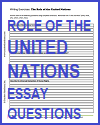| Pivotal Events in the Establishment of Israel DIY Chart Worksheet |
|---|
| www.studenthandouts.com ↣ World History ↣ Middle East Conflict ↣ Middle East Conflict Worksheets |
 |
    |
|
Students are asked to list major pivotal events in the establishment of the modern state of Israel, including the date of the event and its significance. Click here to print. Answers will vary. The establishment of modern Israel was a complex and historically significant process, with several pivotal events and developments that led to the creation of the State of Israel in 1948. Balfour Declaration (1917): The Balfour Declaration, issued by the British government during World War I, expressed support for the establishment of a "national home for the Jewish people" in Palestine. This declaration laid the foundation for Jewish immigration and settlement in the region. Mandate for Palestine (1920): Following World War I, the League of Nations granted Britain the mandate to govern Palestine, including the territory that would become Israel. The mandate included provisions to facilitate Jewish immigration and settlement in the area. Jewish Immigration (Early 20th Century): The influx of Jewish immigrants from Europe and other regions into Palestine increased during the early 20th century, contributing to the growth of the Jewish community in the region. Arab-Jewish Tensions: The growing Jewish presence in Palestine led to tensions and conflicts with the Arab population. These tensions intensified in the 1920s and 1930s, resulting in riots and violence. United Nations Partition Plan (1947): In response to ongoing tensions, the United Nations proposed a partition plan in 1947 to create separate Jewish and Arab states in Palestine. The plan was approved by the UN General Assembly, leading to the establishment of Israel in 1948. Declaration of the State of Israel (1948): On May 14, 1948, David Ben-Gurion, the head of the Jewish Agency, declared the establishment of the State of Israel, marking its official independence. This declaration came on the eve of the expiration of the British Mandate. Arab-Israeli War (1948-1949): Following Israel's declaration of independence, neighboring Arab states, including Egypt, Jordan, Syria, and Iraq, launched a military campaign against Israel. This conflict, known as the 1948 Arab-Israeli War, resulted in Israel's survival and expansion of its territory. Armistice Agreements (1949): Armistice agreements were signed between Israel and its neighboring Arab states, ending the 1948 war. These agreements established the borders of the new Israeli state. International Recognition: Israel's establishment was followed by international recognition and diplomatic relations with various countries, solidifying its status as an independent nation. Population Growth: Israel experienced significant population growth, with Jewish immigrants arriving from various parts of the world, including Europe, North Africa, and the Middle East. Arab-Israeli Conflicts: The establishment of Israel and its expansion led to ongoing conflicts with neighboring Arab states, resulting in subsequent wars, such as the Six-Day War (1967) and the Yom Kippur War (1973). Peace Agreements: Over the years, Israel has signed peace agreements with some of its Arab neighbors, such as Egypt (1979) and Jordan (1994). These agreements have contributed to regional stability. Settlements and Palestinian Conflict: The Israeli-Palestinian conflict remains a central issue in the region, with disputes over land, borders, refugees, and political sovereignty. The ongoing construction of Israeli settlements in the West Bank has been a point of contention. The establishment of Israel was a significant turning point in the history of the Middle East, shaping the geopolitical landscape and influencing regional dynamics for decades. It remains a topic of debate and negotiation in the quest for peace and stability in the region. |
| www.studenthandouts.com ↣ World History ↣ Middle East Conflict ↣ Middle East Conflict Worksheets |














































